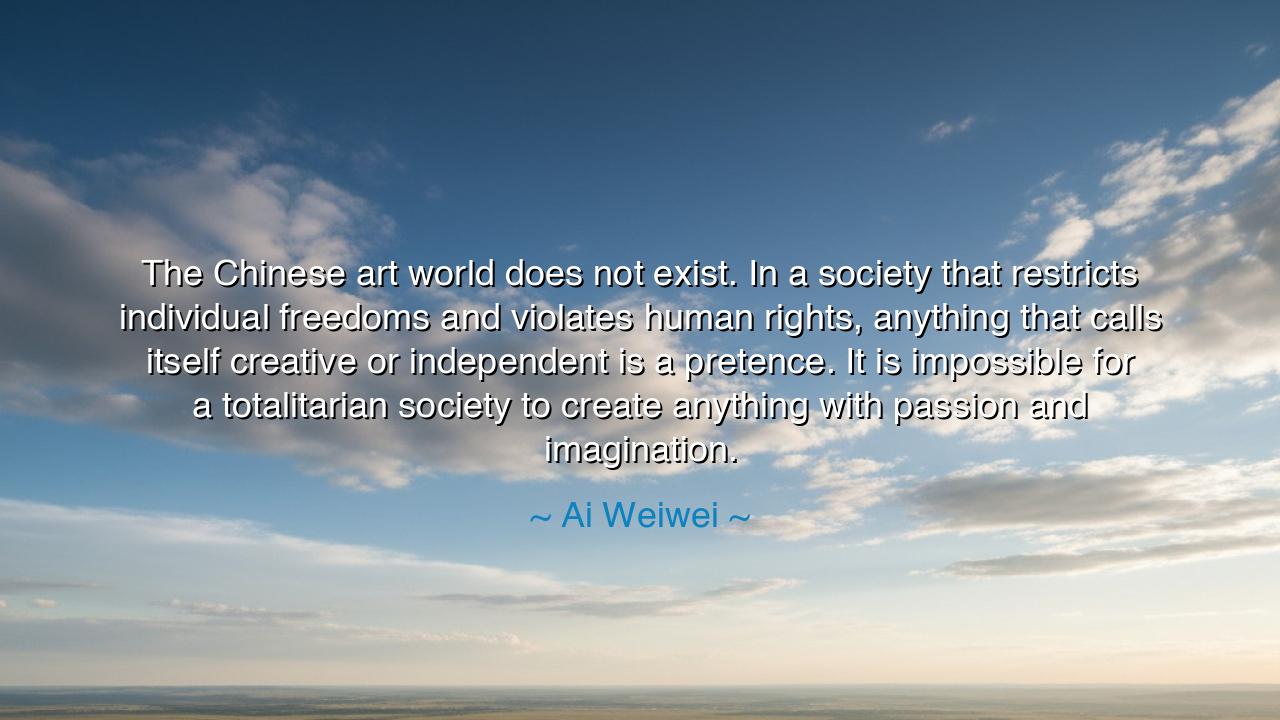
The Chinese art world does not exist. In a society that restricts
The Chinese art world does not exist. In a society that restricts individual freedoms and violates human rights, anything that calls itself creative or independent is a pretence. It is impossible for a totalitarian society to create anything with passion and imagination.






In the fierce and fearless words of Ai Weiwei, the artist and dissident who has stood as a voice for freedom, we hear not only a condemnation, but a lament for the human spirit: “The Chinese art world does not exist. In a society that restricts individual freedoms and violates human rights, anything that calls itself creative or independent is a pretence. It is impossible for a totalitarian society to create anything with passion and imagination.” This is not merely a cry against one government or one nation — it is a universal warning, carved into the stone of human history. For where freedom dies, imagination withers; and where imagination is caged, art, the truest expression of the soul, becomes a hollow echo of obedience.
Ai Weiwei speaks from within the storm of experience. Born in a land that has known both dynastic glory and political darkness, he has seen firsthand how the artist’s voice is silenced beneath the heavy hand of authority. His father, the poet Ai Qing, was once exiled to clean latrines during the Cultural Revolution — a punishment for daring to write with truth. From that inherited wound, Ai Weiwei learned that art and tyranny are eternal enemies. His words arise from that scar, proclaiming that creativity cannot survive under chains, for the act of creation is itself an act of freedom. The origin of his quote lies in rebellion — a rebellion not of violence, but of vision.
In saying that “the Chinese art world does not exist,” Ai does not deny the presence of painters, sculptors, and exhibitions. He speaks of the spirit behind art — the breath of authentic imagination that cannot coexist with fear. In a totalitarian world, every work must bow to approval, every brushstroke must serve propaganda, and every song must be tuned to the key of obedience. Such art may adorn walls and win prizes, but it has no heartbeat. True passion — the sacred fire that makes art transformative — burns only where the mind is free to question, to dream, and to defy. Without that, creation becomes mimicry, and beauty becomes a lie.
History, too, bears witness to this truth. When the Roman Emperor Augustus sought to control poets, he commissioned works that glorified his reign, silencing the voice of dissent. Yet it was Ovid, the exiled poet, whose forbidden verses outlived the marble monuments of the empire. Centuries later, under Soviet rule, the composer Dmitri Shostakovich wrote symphonies under threat of death, hiding his true messages beneath layers of irony and code. His notes trembled between obedience and defiance — art gasping for breath beneath the boot of power. These stories, like Ai Weiwei’s, remind us that imagination cannot be commanded; it can only be liberated.
The totalitarian society, as Ai declares, can build cities of steel and marble, but it cannot build a soul. It can parade monuments, but not miracles. For the imagination — that divine spark that gives rise to art — is born only where thought is unchained. It flourishes in diversity, in contradiction, in the dialogue of minds that are unafraid. Without this, all creation becomes performance, and all artists actors upon a stage owned by the state. The tragedy, then, is not that art disappears, but that it survives only as imitation — a shadow of what it was meant to be.
Yet Ai Weiwei’s words are not despair, but a call to courage. They remind us that the artist’s duty is not to please, but to witness; not to flatter, but to reveal. Even in the darkest prisons, imagination endures — whispering through the cracks, painting upon invisible walls. Ai himself, though censored, surveilled, and imprisoned, continued to create — transforming his suffering into sculptures, photographs, and words that speak to the conscience of the world. His life is proof that even under tyranny, the human spirit can remain unbroken, that art born of truth cannot be buried.
So, my child, take this wisdom as a torch for your own time: never let your imagination be owned by fear. Whether you are an artist, a thinker, or a dreamer, remember that true creation begins with freedom — the freedom to feel, to question, to stand apart. If you live in a place where speech is free, guard it fiercely; if you do not, keep your fire alive in silence until the day it can burn again. For as Ai Weiwei teaches, a world without freedom is a world without passion — and a world without imagination is no world at all.
And thus, let this be your lesson: wherever the human spirit is caged, let the artist become the key. Do not accept the comfort of pretence; seek instead the danger of truth. For from truth comes freedom, from freedom comes imagination, and from imagination — the one gift no tyrant can destroy — comes the immortal art of being human.






AAdministratorAdministrator
Welcome, honored guests. Please leave a comment, we will respond soon